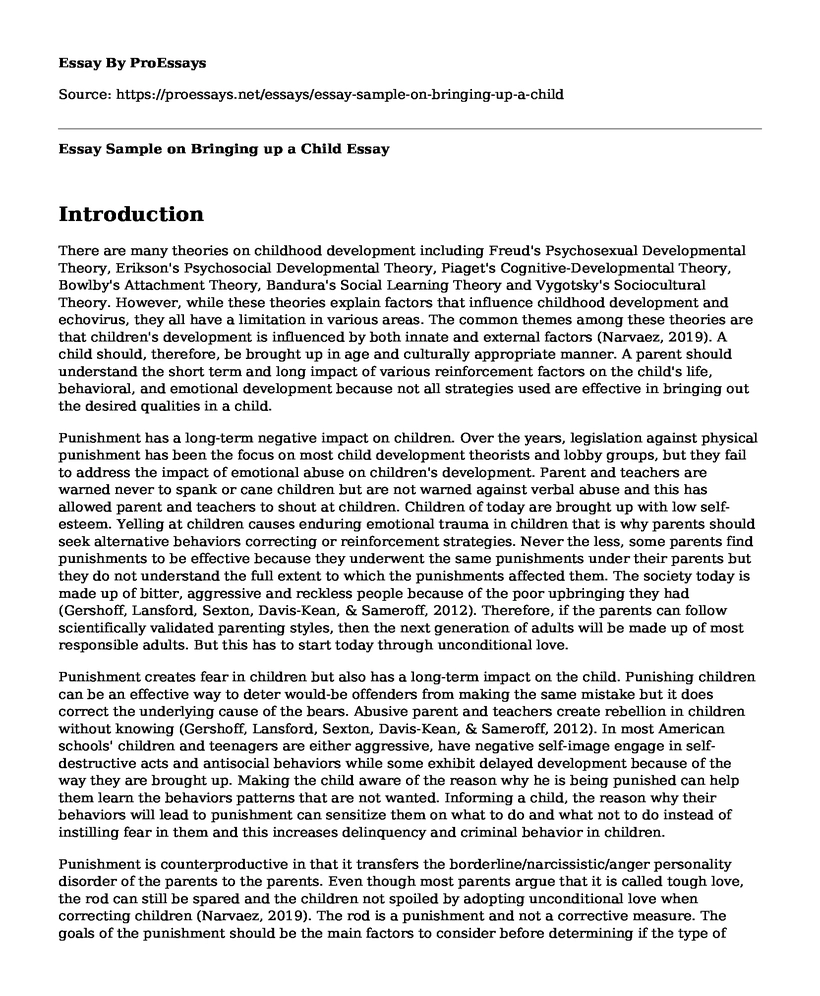Introduction
There are many theories on childhood development including Freud's Psychosexual Developmental Theory, Erikson's Psychosocial Developmental Theory, Piaget's Cognitive-Developmental Theory, Bowlby's Attachment Theory, Bandura's Social Learning Theory and Vygotsky's Sociocultural Theory. However, while these theories explain factors that influence childhood development and echovirus, they all have a limitation in various areas. The common themes among these theories are that children's development is influenced by both innate and external factors (Narvaez, 2019). A child should, therefore, be brought up in age and culturally appropriate manner. A parent should understand the short term and long impact of various reinforcement factors on the child's life, behavioral, and emotional development because not all strategies used are effective in bringing out the desired qualities in a child.
Punishment has a long-term negative impact on children. Over the years, legislation against physical punishment has been the focus on most child development theorists and lobby groups, but they fail to address the impact of emotional abuse on children's development. Parent and teachers are warned never to spank or cane children but are not warned against verbal abuse and this has allowed parent and teachers to shout at children. Children of today are brought up with low self-esteem. Yelling at children causes enduring emotional trauma in children that is why parents should seek alternative behaviors correcting or reinforcement strategies. Never the less, some parents find punishments to be effective because they underwent the same punishments under their parents but they do not understand the full extent to which the punishments affected them. The society today is made up of bitter, aggressive and reckless people because of the poor upbringing they had (Gershoff, Lansford, Sexton, Davis-Kean, & Sameroff, 2012). Therefore, if the parents can follow scientifically validated parenting styles, then the next generation of adults will be made up of most responsible adults. But this has to start today through unconditional love.
Punishment creates fear in children but also has a long-term impact on the child. Punishing children can be an effective way to deter would-be offenders from making the same mistake but it does correct the underlying cause of the bears. Abusive parent and teachers create rebellion in children without knowing (Gershoff, Lansford, Sexton, Davis-Kean, & Sameroff, 2012). In most American schools' children and teenagers are either aggressive, have negative self-image engage in self-destructive acts and antisocial behaviors while some exhibit delayed development because of the way they are brought up. Making the child aware of the reason why he is being punished can help them learn the behaviors patterns that are not wanted. Informing a child, the reason why their behaviors will lead to punishment can sensitize them on what to do and what not to do instead of instilling fear in them and this increases delinquency and criminal behavior in children.
Punishment is counterproductive in that it transfers the borderline/narcissistic/anger personality disorder of the parents to the parents. Even though most parents argue that it is called tough love, the rod can still be spared and the children not spoiled by adopting unconditional love when correcting children (Narvaez, 2019). The rod is a punishment and not a corrective measure. The goals of the punishment should be the main factors to consider before determining if the type of punishment or corrective measure will be effective in achieving the goals. Children end up becoming the abusive parents that their parents were and the vicious cycle continues.
Conclusion
Instead of punishing children, parents and teachers should invite children to interact with them. Conversation can help unearth a lot of underlying reasons and factors that contribute to the children's behaviors. Instead of creating fear and using fear as a deterrent for bad behaviors, it is important to understand the psychological, and sociological causes of some behaviors in children. Undesirable behaviors in children are as a result of the interaction between the mental state and social situation. From a behaviorist perspective, it is unhealthy to be conditioned by pain as the children be conditioned in such a way that they cannot change their undesirable behaviors unless they are beaten. Understanding the condition under which some children's behavior, actions, and feelings occur can help in bringing up a physician, mentally, and emotionally healthy children. Parents and teachers should develop a close relationship as this is the only way that the children will be encouraged to share their problems, difficulties, and fears and allow the teachers and parents to understand them and know how to react appropriately to them.
References
Gershoff, T., Lansford, E., Sexton, R., Davis-Kean, E., & Sameroff, J. (2012). Longitudinal links between spanking and children's externalizing behaviors in a national sample of White, Black, Hispanic, and Asian American families. Child Development, 83, 838-843.
Narvaez, D. (2019). Research on Spanking: It's Bad for ALL Kids. Retrieved from https://www.psychologytoday.com/us/blog/moral-landscapes/201309/research-spanking-it-s-bad-all-kids
Cite this page
Essay Sample on Bringing up a Child. (2022, Dec 05). Retrieved from https://proessays.net/essays/essay-sample-on-bringing-up-a-child
If you are the original author of this essay and no longer wish to have it published on the ProEssays website, please click below to request its removal:
- President Obama Motivational Speech to Elementary School Children
- Paper Example on Macro-Linguistic
- Classroom Management Need Analysis Essay
- Selective Serotonin Reuptake Inhibitors (SSRIs) Paper Example
- Attitude Towards Mental Illness: Annotated Bibliography
- Activity Boards: Ideal Toys for Babies in Piaget's Stage - Essay Sample
- Paper Sample on Leadership Style Impact on School Performance & Rapid Improvement







